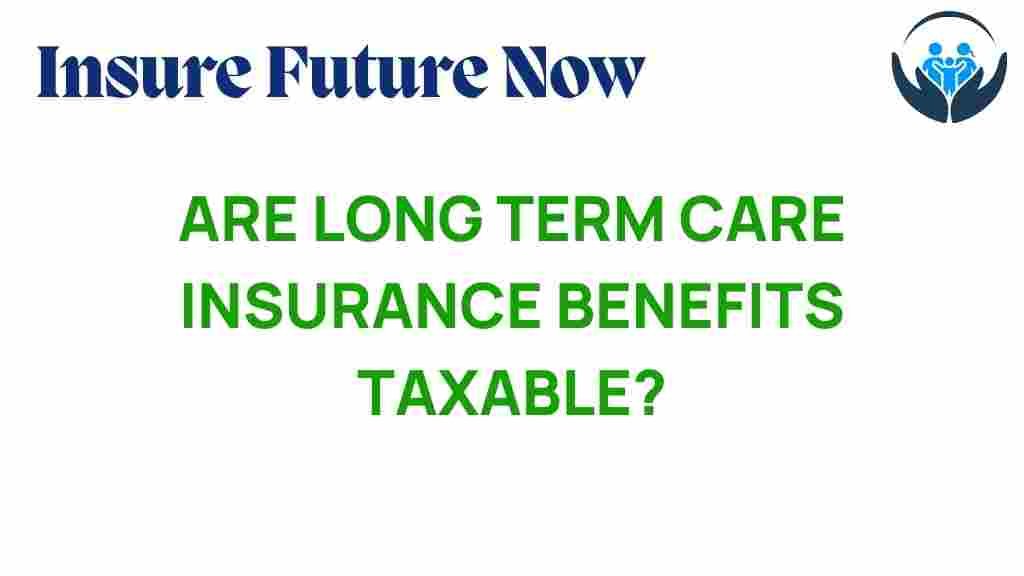Are Long Term Care Insurance Benefits Taxable?
Long term care insurance has become a critical component of financial planning for many individuals as they approach retirement. Understanding the tax implications of these policies is essential to effectively manage health care costs and maximize benefits eligibility. This article will explore the question: are long term care insurance benefits taxable? We will delve into the details of how these policies work, the tax treatment of benefits, and the broader implications for retirement planning.
Understanding Long Term Care Insurance
Long term care insurance is designed to cover the costs associated with long-term care services, which may include assistance with daily activities such as bathing, dressing, and eating. These services can be provided in various settings, including at home, in assisted living facilities, or in nursing homes. Given the rising costs of health care, having a robust insurance policy can significantly alleviate financial burdens in later years.
Key Features of Long Term Care Insurance Policies
- Coverage Types: Policies may vary in coverage, including home care, nursing home care, and assisted living facilities.
- Benefit Amount: The benefit amount can be daily or monthly, depending on the policy.
- Elimination Period: This is the waiting period before the benefits kick in, which can range from a few days to several months.
- Inflation Protection: Some policies offer options to increase benefits over time to keep pace with rising health care costs.
The Tax Implications of Long Term Care Insurance
When considering long term care insurance, it’s crucial to understand the tax implications associated with the benefits received from these policies. In general, the benefits paid out under a long term care insurance policy are not taxable, provided certain conditions are met.
Tax-Free Benefits
According to the Internal Revenue Service (IRS), long term care insurance benefits that you receive as a policyholder are typically tax-free. This means that as you claim benefits to cover your health care costs, you will not have to pay income tax on those amounts. However, this tax treatment applies only if the benefits are used for qualified long-term care services.
Qualified Long Term Care Services
To ensure that benefits remain tax-free, they must be used for qualified long-term care services. These services include but are not limited to:
- Assistance with activities of daily living (ADLs)
- Skilled nursing care
- Home health care
- Respite care
When Benefits May Be Taxable
While most benefits from long term care insurance are tax-free, there are scenarios where this may not be the case:
- Exceeding IRS Limits: The IRS has set limits on the maximum deductible amounts for long term care insurance premiums based on the insured’s age. If your benefits exceed these limits, the excess may be considered taxable income.
- Policy Structure: If the policy is structured in a way that it acts more like an investment rather than insurance, such as a hybrid life insurance policy with long-term care benefits, the tax implications could differ.
Deductibility of Premiums
Another important aspect of long term care insurance involves the deductibility of premiums. Depending on your situation, you may be able to deduct the premiums paid for long term care insurance on your tax return. The deductibility is subject to certain limitations and thresholds.
- Medical Expense Deduction: Long term care insurance premiums can be included as part of your medical expenses if you itemize deductions. The total medical expenses must exceed 7.5% of your adjusted gross income (AGI) to qualify for a deduction.
- Age-Based Limits: The IRS sets annual limits on the amount of premium that can be deducted based on your age. For example, if you are over 70, the limit is higher than for those under 60.
Benefits Eligibility and Planning
When assessing the eligibility for benefits under a long term care insurance policy, it’s essential to thoroughly review your insurance policy and understand the criteria that must be met to qualify. The following steps can help you navigate this process:
Step 1: Review Policy Details
Read your policy carefully. Look for sections detailing coverage, benefit triggers, and exclusions. Understanding these details is critical for effective financial planning.
Step 2: Assess Your Needs
Consider your health care needs and potential future needs. Assessing your current health status and family history of health issues can influence your decision-making.
Step 3: Consult with Financial Advisors
Engaging with financial planners or tax professionals can provide personalized insights and help you understand the financial implications of long term care insurance in your retirement planning.
Common Troubleshooting Tips
If you run into issues regarding your long term care insurance or its tax implications, consider these troubleshooting tips:
- Contact Your Insurer: If there’s confusion about your benefits or coverage, reach out to your insurance provider for clarification.
- Document Everything: Keep detailed records of all communications with your insurer, as well as medical records that support your claim.
- Seek Professional Advice: If tax implications or eligibility are unclear, consult with a tax professional who has experience in long-term care insurance.
Understanding whether long term care insurance benefits are taxable is crucial for effective financial planning and retirement strategies. While most benefits are tax-free when used for qualified long-term care services, it’s essential to remain aware of potential tax implications and eligibility criteria. By reviewing policies, consulting with professionals, and planning ahead, you can navigate the complexities of long term care insurance and ensure that you are prepared for future health care costs.
For more information on long term care insurance and its implications for your financial future, consider visiting resources such as the IRS website for up-to-date tax guidelines, or check out our comprehensive guide on retirement planning.
This article is in the category Policies and created by InsureFutureNow Team
